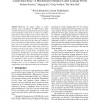Free Online Productivity Tools
i2Speak
i2Symbol
i2OCR
iTex2Img
iWeb2Print
iWeb2Shot
i2Type
iPdf2Split
iPdf2Merge
i2Bopomofo
i2Arabic
i2Style
i2Image
i2PDF
iLatex2Rtf
Sci2ools
119
click to vote
PACS
2000
Springer
2000
Springer
Cache-Line Decay: A Mechanism to Reduce Cache Leakage Power
Reducing the supply voltage to reduce dynamic power consumption in CMOS devices, inadvertently will lead to an exponential increase in leakage power dissipation. In this work we explore an architectural idea to reduce leakage power in data caches. Previous work has shown that cache frames are "dead" for a significant fraction of time [14]. We are exploiting this observation to turn off cache lines that are not likely to be accessed anymore. Our method is simple: if a cacheline is not accessed within a fixed interval (called decay interval) we turn off its supply voltage using a gated Vdd technique introduced previously [1]. We study the effect of cache-line decay on both power consumption and performance. We find that it is possible with cache-line decay to build larger caches that dissipate less leakage power than smaller caches while yielding equal or better performance (fewer misses). In addition, because our method can dynamically trade performance for leakage power it ca...
Related Content
| Added | 25 Aug 2010 |
| Updated | 25 Aug 2010 |
| Type | Conference |
| Year | 2000 |
| Where | PACS |
| Authors | Stefanos Kaxiras, Zhigang Hu, Girija J. Narlikar, Rae McLellan |
Comments (0)

